2001: A Space Odyssey revisited
- Published
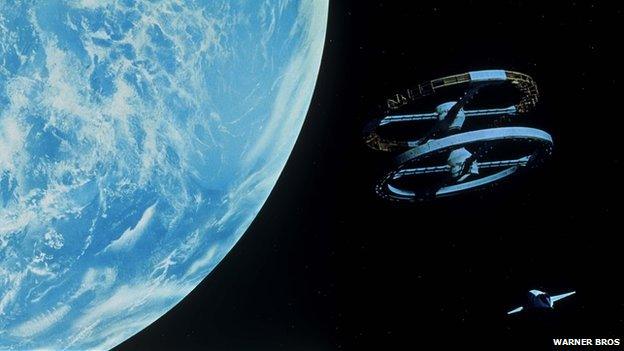
2001: A Space Odyssey is now considered a science-fiction classic
It's 46 years since 2001: A Space Odyssey took movie science-fiction to new levels of audacity and technical accomplishment.
Stanley Kubrick's classic remains the benchmark by which subsequent space epics have been judged. As 2001 is re-released in Britain, its American stars recall the thrill of imagining outer space - and beyond.
Almost 50 years ago, American actor Keir Dullea was shooting a film in London for director Otto Preminger.
"It was called Bunny Lake is Missing and I was so excited to be working with Laurence Olivier. But there were also certain tensions, so I was pleased to have an afternoon off," he says.
"I went to the old Battersea fun fair in London. A palm reader told me I must be an engineer or a scientist because he could see a rocket-ship in my palm.
"I thought it was all nonsense, but then my agent rang out of the blue to tell me I'd been offered a role as an astronaut in 2001: A Space Odyssey.
"The funny thing is that people sometimes now assume Stanley Kubrick must have been impossible to work for. In fact Stanley was a delight and an absolute gentleman throughout - he was so calm. It was Preminger who was the horror."
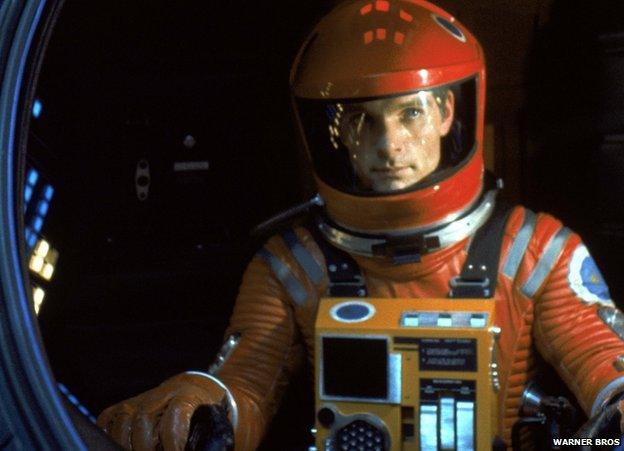
Keir Dullea starred as Dr Dave Bowman in the film
Gary Lockwood, who played space scientist Dr Frank Poole, is now 77.
"I'd seen my first Kubrick film when I was barely out of my teens. It was The Killing. and I remember it was the first time I ever paused in a theatre lobby to see who had made the picture.
"So when, years later, I heard I was in 2001, it was a thrill."
By the mid-1960s Kubrick was regarded by many as America's leading film-maker, despite having made Lolita and Dr Strangelove in the UK.
Production on 2001 took almost four years and was based at MGM's Borehamwood studios, which closed in 1970.
Long before today's CGI, Kubrick and teams of technicians created a convincing space adventure, set largely on Discovery One as it nears Jupiter.
The spacecraft was evoked by a blend of full-size sets, model shots and Kubrick's great skill at knowing where to place a camera for effect.
Upon arriving at MGM Borehamwood, says Dullea, it was obvious how extraordinary the sets were going to be.
"People always remember the vast centrifuge where the audience encounters Frank Poole and my character, Dave Bowman," he says.
"It was 80 feet tall, almost reaching the studio ceiling. It was made to order by Vickers and, at today's prices, I'm told it would cost $5m [£3.2m]."
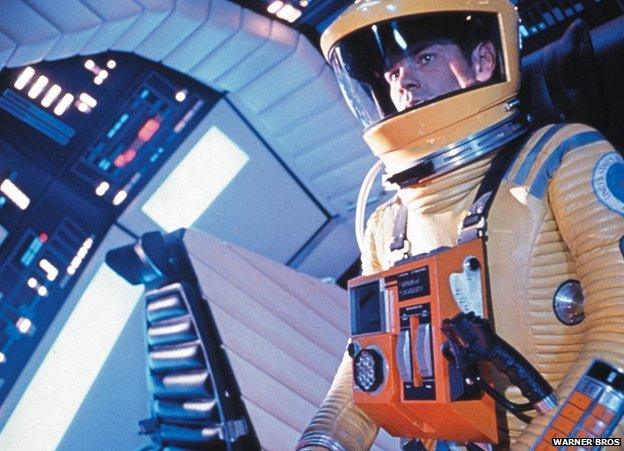
Gary Lockwood played Dr Frank Poole
Lockwood says Kubrick had a genius for creating convincing worlds on screen. "There are times when you're sure the monitors are modern video screens.
"In fact, often it's a 35mm image being projected onto the screens… but it looks as convincing today as when the movie came out in 1968.
"There's a sequence where Bowman and Poole are watching a BBC programme on what today looks amazingly like an iPad. The way Stanley anticipated what was to come is astounding."
Dullea recalls the part of the script that changed most was the concluding section, Beyond the Infinite.
It is this part of the story, where Dullea's character appears to travel beyond time, which has won 2001: A Space Odyssey its lasting reputation as an adventure with an edge of the hallucinogenic.
The sequence seems to take place in some elegant chateau, where Bowman somehow meets his older self.
"In the original screenplay it was to have been more like an anonymous modern hotel room. I can't really tell you why Stanley changed things and it baffled some audiences at the time," he says.
So did Dullea find it hard playing the extended sequence, knowing the audience would have no real idea what was going on?
"It's no different from any other scene for the actor. Bowman's reaction is the same as that of the audience: that this is all really, really strange. He doesn't know more than people watching in the cinema do."
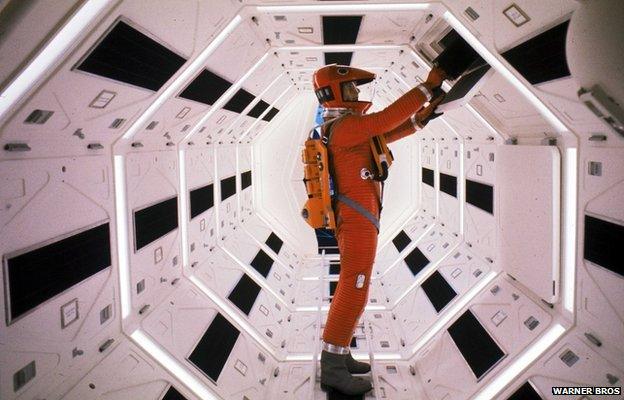
The sets were created at MGM Borehamwood
Physically, Lockwood says, the film was not especially tough to work on. "I've been on westerns; that's tough.
"With Stanley, we often only did a couple of set-ups a day and he would happily spend hours lighting a shot. Some days 2001 could be a Zen kind of experience."
Though the film is now regularly quoted as a classic, Lockwood remembers that in 1968 reactions were mixed. The split was illustrated by early screenings in the USA.
"We had the first screening in Washington DC with a VIP audience," he says. "Lots of people left at intermission: I think they'd have been happier with Rock Hudson and Cary Grant in the leads.
"Then we moved up to New York City, where you get the sophisticated Broadway crowd, and the reception was warmer. When we opened in LA people loved it."
It is impossible to discuss 2001: A Space Odyssey without mentioning the character some regard as its true star - the computer HAL, who exists only as a voice.
Kubrick initially cast actor Nigel Davenport in the role, but later decided he did not want a British voice.
In post-production HAL's dialogue - polite but increasingly chilly - would be supplied by Canadian actor Douglas Rain.
During most of the filming, Dullea remembers, no actor was assigned to the role.
"Mainly it was Stanley's first assistant Derek Cracknell who read for us off-camera and the lines were dubbed in later," he says.
"Derek had a Cockney accent, so in quite a comic way the shoot was unlike the finished product. It was a bit like playing opposite Michael Caine."
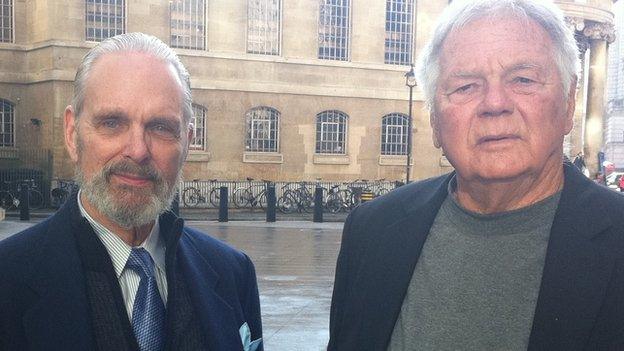
Keir Dullea and Gary Lockwood today
On its initial release, the posters for 2001 proclaimed "an epic drama of adventure and exploration". Dullea recalls that after a few months, the line was changed.
"Someone came up instead with '2001: The Ultimate Trip'. Obviously that has certain connotations, and it still influences what people think about the movie all these years later.
"You can take 2001 all kinds of ways. But I still think it's one of the most fascinating movies ever made and it's astoundingly beautiful to look at.
"I don't think it's ever been bettered. I was in a masterpiece of cinema, and not many actors can say that."
2001: A Space Odyssey has been re-released by the BFI as part of its Sci-Fi: Days of Fear and Wonder programme.